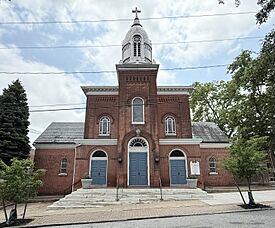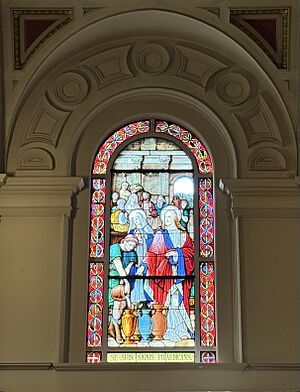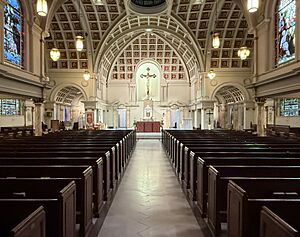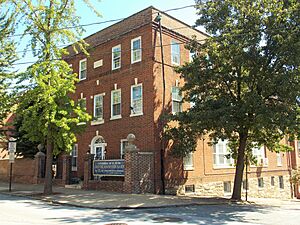Cathedral of Saint Peter (Wilmington, Delaware) facts for kids
Quick facts for kids Cathedral of Saint Peter |
|
|---|---|

Cathedral of Saint Peter in 2025
|
|
| 39°44′34″N 75°33′12″W / 39.7428°N 75.5532°W | |
| Location | West 6th Street Wilmington, Delaware |
| Country | United States |
| Denomination | Roman Catholic Church |
| Website | www.cathedralofstpeter.com |
| History | |
| Founded | 1869 |
| Consecrated | 1905 |
| Architecture | |
| Architect(s) | Pierre Bauduy |
| Style | Romanesque Revival |
| Completed | 1818 |
| Specifications | |
| Length | 60 feet (18 m) |
| Width | 30 feet (9.1 m) |
| Materials | Brick |
| Administration | |
| Diocese | Wilmington |
The Cathedral of Saint Peter is a very important church in Wilmington, Delaware. It is the main church for the Roman Catholic Diocese of Wilmington. This means it's like the "home base" for all Catholic churches in the area. The cathedral building, along with its rectory (where priests live), convent (where nuns live), and school, are all part of the Quaker Hill Historic District. This district is a special historical area listed on the National Register of Historic Places.
Contents
Building History
Early Design and Construction
Saint Peter's Church was designed in 1816 by an architect named Pierre Bauduy. He also helped plan the Wilmington town hall. The first stone for the church, called the cornerstone, was placed in 1816. The building was made of brick and measured about 30 by 40 feet (9.1 by 12 meters). It was built in the Romanesque style, which uses round arches and strong, thick walls.
The church was officially opened on September 12, 1818. The very first church service, called a Mass, was held the next day by Father Patrick Kenny. In 1829, the church added a bell tower. They also made the building longer, reaching its current length of 60 feet (18 m).
Upgrades for Cathedral Status
In 1868, Pope Pius IX created the Diocese of Wilmington. A diocese is a church district led by a bishop. This meant Saint Peter's needed to be ready to become a cathedral. A cathedral is the main church of a diocese.
Starting in 1870, many improvements were made. Artists added frescoes, which are paintings on wet plaster, to the walls. A marble baptistery (a place for baptisms) was installed. Three new altars (tables where religious ceremonies are held) were added. A special railing, called a chancel railing, was put in. The church also got a barrel-domed roof, which looks like a half-cylinder. A bishop's cathedra (the bishop's special chair) was also placed in the church.
Around 1900, beautiful stained glass windows were installed. These windows were made in the "Munich-style." They were likely created by Franz Xavier Zettler or his student, Franz Mayer. Both were famous glass artists from Bavaria, Germany.
Becoming a Pro-Cathedral
The church upgrades were finished in 1905. Saint Peter's was ready to be officially named a cathedral. Archbishop Diomede Falconio, a special representative from the Vatican, came for the ceremony. However, when he arrived, he saw that Saint Peter's was connected to a rectory (the priest's house) and a school.
According to Vatican rules, a cathedral had to be a separate building. So, Archbishop Falconio decided to call Saint Peter's a "pro-cathedral" instead. This meant it was serving as a cathedral temporarily. Later, the diocese made more changes to Saint Peter's. It was then fully consecrated and became a true cathedral.
Modern Renovations
The church had more renovations in 1981. These repairs fixed structural damage. They also changed the sanctuary (the main area around the altar) to fit new church practices. These changes came after the Second Vatican Council, a big meeting of church leaders.
In 1991, contractors added flying buttresses to the outside walls. These are supports that help hold up the building. They also added a strong steel frame for the pillars and the choir loft.
2007 Improvements
By 2007, Saint Peter's needed more work. A decorative plaster rosette fell from the ceiling into one of the pews (church benches). There were also leaks in the roof. The church also wanted to fix a problem from earlier work. Two metal poles had been added to support the arches. But these poles blocked the view of the tabernacle (a special cabinet holding the Blessed Sacrament).
A grant from the Catholic Diocese Foundation helped replace the roof. The church stayed open for services during this time. With help from Father Joseph Cocucci, the church's rector, more renovations happened:
- The cathedra (bishop's chair) was moved to the side of the sanctuary.
- The tabernacle was moved back to the center, behind the altar.
- A special area for Mary, mother of Jesus was created. It was made easy to access for people with physical disabilities.
- The baptismal font (a basin for baptism) was placed near the church entrance.
On November 22, 2007, Bishop Michael Saltarelli thanked Father Cocucci. He praised him for putting the Blessed Sacrament (a sacred part of the Mass) back in its proper place.
Rectors of Saint Peter's
A rector is a priest who leads a church parish. The Cathedral of Saint Peter has had sixteen rectors since 1804:
- Rev. Patrick Kenny (1804–1840)
- Rev. Patrick Reilly (1840–1850)
- Rev. Jeremiah O'Donohoe (1851–1855)
- Rev. Patrick Prendergast (1855–1859)
- Rev. Patrick O'Brien (1859–1867)
- Rev. Matthew McGrane (1867–1868)
- Most Rev. Thomas A. Becker (1868–1886)
- Msgr. John Lyons (1887–1916)
- Msgr. John J. Dougherty (1916–1948)
- Msgr. Joseph Sweeney (1949–1968)
- Rev. John P. McLaughlin (1968–1977)
- Rev. James E. Richardson (1977–1982)
- Msgr. Paul J. Taggart (1982–1994)
- Rev. William B. Kauffman (1995–2001)
- Rev. Michael J. Carrier (2001–2005)
- Rev. Joseph M. P. R. Cocucci (2006–present)
See also
 In Spanish: Catedral de San Pedro (Wilmington) para niños
In Spanish: Catedral de San Pedro (Wilmington) para niños
- List of churches in the Roman Catholic Diocese of Wilmington
- List of Catholic cathedrals in the United States
- List of cathedrals in the United States
 | Emma Amos |
 | Edward Mitchell Bannister |
 | Larry D. Alexander |
 | Ernie Barnes |




